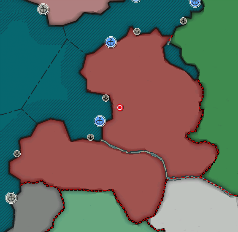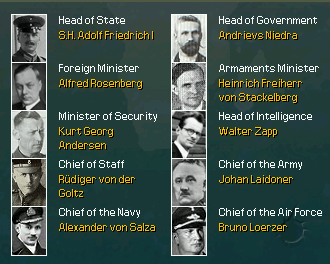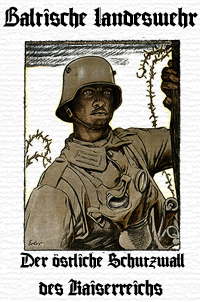United Baltic Duchy
From Kaiserreich
| ||||

| ||||
| Official Language | German | |||
| Capital | Riga | |||
| Head of State | Adolf Friedrich | |||
| Head of Government | Andrievs Niedra | |||
| Establishment - Treaty of Brest-Litovsk | March 3, 1918 | |||
| Government | Constitutional Monarchy | |||
| Currency | Papiermark | |||
The United Baltic Duchy was established as a tributary state of the German Empire in the aftermath of the collapse of the Russian Empire in the face of decisive German offensives. The early days of the Duchy were not the best ones, as it had to fight for survival in the face of nationalist Estonian and Latvian forces, supported by the Entente. The bolshevik threat from the east, the general chaos in the years of the Russian Civil War until German intervention helped ensure White Russian victory, all this has left a mark on the baltic country.
The Baltischer Landeswehr, the armed forces of the newly established state, performed admirably during the wars of establishment and even came to be semi-seriously referred to as the östliche Schutzwall des Kaiserreichs (the Eastern Rampart of the Empire). The term was quickly picked up by official Duchy propaganda agencies to stress the importance of the Baltic state to the Empire as a whole.
Initially, and unlike other states established in the areas of western Russia ceded to Germany, the United Baltic Duchy was expected to one day become a formal constituent state of the German Empire. However, internal problems in both the Fatherland and in the Duchy itself have delayed initial plans.
Contents |
History
Politics
|
Duke: His Highness Adolf Friedrich (born 10 October 1873)
Prime Minister: Andrievs Niedra (born 8 February 1871)
Minister of Relations with the German Empire: Alfred Rosenberg (born 12 January 1893)
Minister of Economy: Baron Heinrich von Stackelberg (born 31 October 1905)
Minister for Colonization: Hans Georg Andersen
Director of Secret Services: Walter Zapp (born 4 September 1905)
Chief of the General Staff of the Baltischer Landeswehr: General Rüdiger von der Goltz (born in 1865)
Commander of the Baltischer Landeswehr: General Johan Laidoner (born 12 February 1884)
Commander-in-Chief of the Baltischer Marine: Admiral Alexander von Salza (born 16 April 1885)
Commander-in-Chief of the Baltischer Luftwaffe: Bruno Loerzer (born 22 January 1891)
Military
|
The Baltiches Landeswehr is military the United Baltic Duchy, formed in the aftermath of its creation in 1918 as a first line of defence against nationalist latvian and estonian insurgents, as well as bolshevik and even Entente expeditions. The Landeswehr comprises several ground divisions, as well as a small air arm and a naval arm. Service is voluntary and open to Ducal citizens of German origins and background.
The headquarters of the Landeswehr are established in Riga, the Duchy's capital. Riga is also home to the Iron Division(cavalry), the strongest and most capable of all Landeswehr divisions. The remaining forces are divided into two "corps". The Northern Corps has its headquarters at Narva and is comprised of the 1st German-Baltic Division (infantry) and of the Estland Security brigade. The Eastern Corps has its headquarters at Dagauvpils and comprises the 2nd German-Baltic Division (infantry) and the Livland Security brigade.
The Landeswehr's air arm comprises a single squadron of interceptors. The naval arm comprises a single Heavy Cruiser, the VBHS Feuchtwangen, and a small detachment of screening and support ships.
All in all, the Baltiches Landeswehr is a small force, equipped and trained in accordance with German parameters and closely integrated with the German army. It's small size makes it oriented largely on upkeeping interior peace than providing any realistic resistance in case of a Russian invasion.




